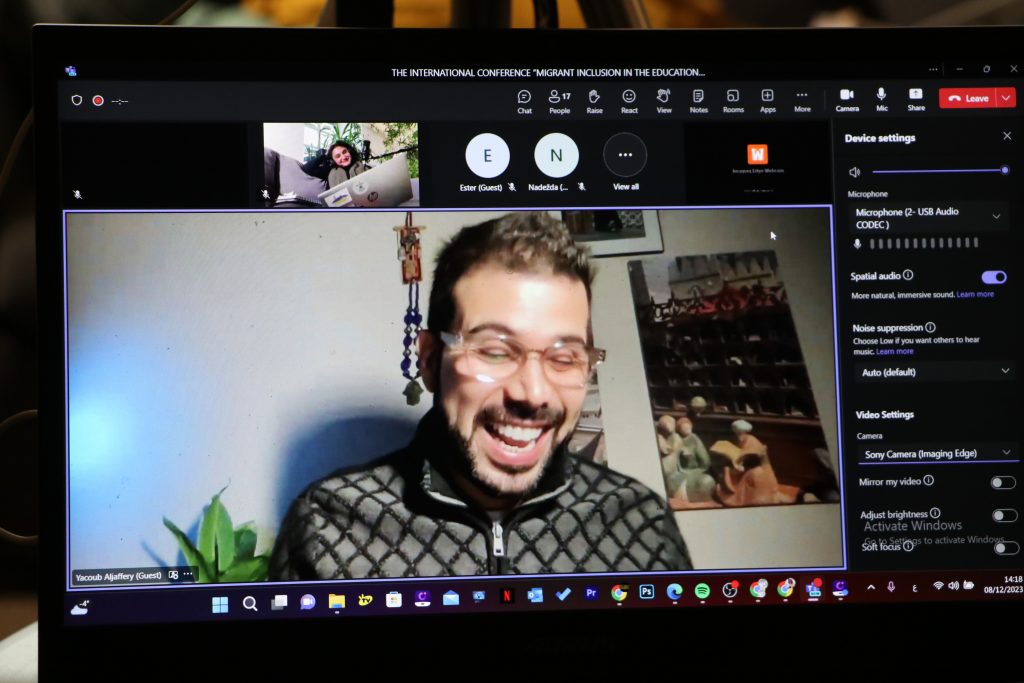In a globalized world, the movement of people across borders presents both challenges and opportunities. The recent International Conference on Migrant Inclusion in the Education System, organized by the National Institute for Social Integration and supported by the European Union, served as a platform to explore innovative strategies fostering migrant integration and empowerment through education.
The conference, held in an engaging setting with a diverse panel of speakers from various backgrounds and expertise, aimed to redefine the narrative around migrant education and pave the way for inclusive educational models.
Opening Doors to Understanding: A Panoramic Overview
From Lithuania to the United States, Iraq to Italy, and beyond, speakers from various corners of the world lent their unique insights, infusing the conference with a rich tapestry of cultural experiences.
Kicking off the event, the conference introduced diverse perspectives on migrant education. From Dr. Yacoub ALJAFFERY, a passionate advocate for refugee and immigrant students, to Mushreq Albosleemi, a self-taught multilingual poet and refugee, each speaker painted a vivid picture of the challenges and triumphs within the migrant community.
Nadežda, a teacher and peace activist, brought attention to the need for experiential learning and communal educational models to foster societal change. Her initiative with Innovators Valley in Lithuania showcases an innovative approach to empowering citizens to become proactive leaders and innovators.
A Mosaic of Insights: Speakers and Their Impactful Dialogues
Ali Khalaf, former manager of the Cultural Center at the University of Basra, emphasized the importance of critical thinking and problem-solving skills in international student mentorship. His insights shed light on the value of inclusive policies in unlocking the potential of migrant talent.
Sviatlana Haluza, a Belarusian refugee and cancer survivor, shared her heartfelt journey through a forthcoming book. Her narrative not only touched upon the struggles of being a refugee but also emphasized the power of resilience, love, and friendship in times of adversity.
Dr. Vassim Valid AJAJ, a prominent otorhinolaryngology surgeon and consultant, highlighted the crucial importance of cultural sensitivity for migrant populations, drawing from his local expertise and experience.
 Navigating the Future: A Call to Action
Navigating the Future: A Call to Action
Panel discussions and dialogues during the conference resonated around the need to create an inclusive educational landscape. Discussions delved into implementing innovative teaching methods, acknowledging the cultural wealth brought by migrants, and the role of language in fostering integration.
The closing remarks highlighted the importance of collaborative efforts in reshaping education systems worldwide to accommodate diverse learners and to harness the potential of migrant communities.
Acknowledging the Movers and Shakers Behind the Scenes
The conference’s success owes much to the diligent efforts of the organizing team: Inga Rancova, Mohammed Alamiry, Sikna Ataya, Justina Gau, and Rawan Ashour, who orchestrated a platform conducive to diverse dialogue and learning.
In conclusion, the conference was a testament to the transformative power of education in fostering inclusive societies. The insights shared by the speakers and the engaging discussions underscored the urgent need for proactive measures to embrace diversity, celebrate cultural richness, and create educational systems that cater to the needs of all.
The dialogue sparked at this conference serves as a beacon of hope for a future where education transcends borders and nurtures a world of understanding, acceptance, and opportunity for all.

